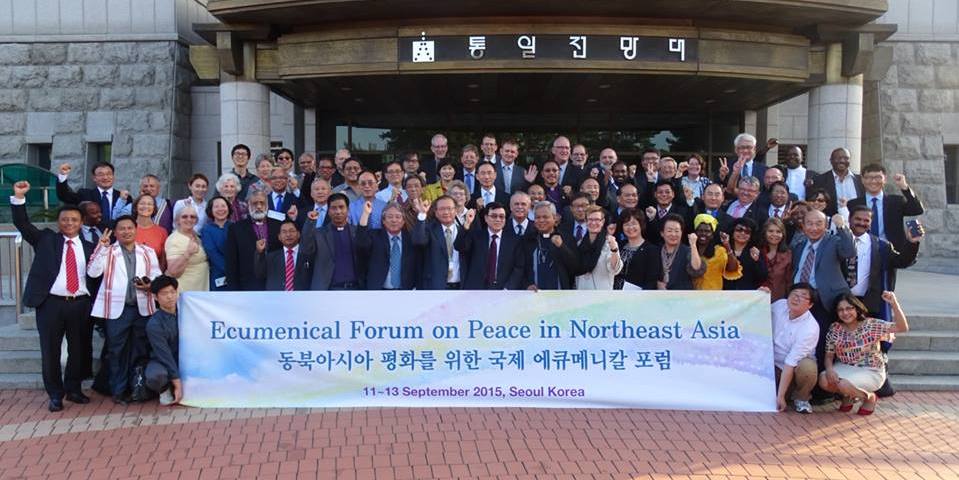PEACE and Security in North East Aisa
 ECUMENICAL FORUM ON PEACE IN NORTH EAST ASIA
ECUMENICAL FORUM ON PEACE IN NORTH EAST ASIA
11-13 September 2015
The Presbyterian Church of Korea (PCK) and the Presbyterian Church of the Republic of Korea celebrated their respective hundredth General Assembly with the themes “Lord, let us be reconciled!” (1 Corinthians 5:18 – 21/ Genesis 33:1 – 4) and ‘Do this in remembrance of me.’ (Deuteronomy 8:11-20, 1 Cor. 11: 23 –26, Luke 22:19 –20)
Apart from the Assembly, other events were also held in honor of this significant milestone in the history and life of the PCK and the PROK. One of them was the ‘Ecumenical Forum on Peace in North East Asia’ jointly hosted by both the Presbyterian churches, from 11-13 September 2015, to discuss, reflect and respond to the pressing faith and ethical issues on justice, people’s security, reconciliation, peace and peaceful reunification of the Korean peninsula. After the Forum the participants visited Imjingak, an important site on the DMZ (demilitarized zone) that divides North and South Korea, where they held a special prayer service for peace and reunification of the Korean Peninsula.
More than 120 representatives and leaders of churches and ecumenical institutions from various Christian traditions and from 20 countries of the global regions, Africa, Asia-Pacific, Europe, North and South America attended this Forum and agreed to support any initiative for peaceful reunification of the North and South. CCA was represented by Rev. Jung Eun Moon (Grace), Executive Secretary for Faith, Mission and Unity.
The Participants of this Forum made ten commitments toward the peaceful reunification of Korean Peninsula:
- Nurture a new Koinonia beginning with churches, in which hatred and hostility are overcome, and a transformative spirituality for life is nurtured.
- Actively encourage and involve churches and ecumenical bodies to continue initiatives for healing, justice, reconciliation, and peace in Northeast Asia, and the reunification of North and South Korea.
- Provide common platforms for churches and Christians, as well as people of other faiths and civil society, from both North and South to meet together in order to advance towards reconciliation and peace.
- Develop approaches to peace education and advocacy for peace and reunification. These approaches should be intergenerational, cultivate ecumenical spirituality of resistance to war and violence, nurture theological reflection in our own contexts, and evolve a new vision of a world with justice, peace and a life together.
- Promote the participation and leadership of women in initiatives for peace with justice in the region, and for reunification of the Korean Peninsula.
- Invite and encourage all churches in the region to actively participate in the bilateral and multilateral programs and actions that pursue peace and reunification processes.
- Focus our efforts to seek a final peace treaty that replaces the Armistice Agreement.
- Commit to support global ecumenical endeavors to contain and delegitimize nuclear power and arms in all parts of the world.
- Mobilize all new modes of media to highlight the issue of peace in Northeast Asia in order to broaden and strengthen solidarity.
- Commit to process of holding peace for all to continue the momentum of this historic ecumenical gathering by encouraging the PCK, PROK, and the NCCK to convene such peace consultations biannually, and encourage partner churches globally to prioritize their ecumenical agenda to include action and advocacy on Northeast Asia.
Hope that this 10 point charter will steer the ecumenical forum on to peaceful shores where all will be one, and will enjoy fullness of life for all. Let this be our prayer: Lord, let us be reconciled…










